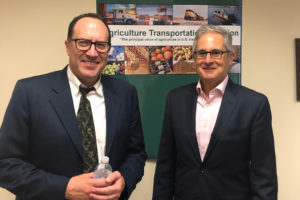Transportation Roundup: News from TPM23 and more
Many people in the container shipping and logistics industry are attending the TPM23 conference this week in Long Beach, Calif. News from the event can be found on the Journal of Commerce website, but here are some leading stories in the shipping industry.
Container shipping analysts warned of upcoming blank sailings on the trans-Pacific this spring to prevent a further decline of east-bound spot rates. These blank sailings will not correct overcapacity, though, with capacity set to expand 9 percent in both 2023 and 2024. Although container rates are already back down to early 2020 rates, east-bound container spot rates will continue to fall further if containers lines don’t significantly blank their capacity. Read more here.
Hapag-Lloyd is the latest shipping line to adopt clean energy, signing an agreement with Shell to supply liquefied natural gas (LNG) for their large dual-fuel container vessels. LNG will enable Hapag-Lloyd to reduce the CO2 intensity of its vessels by up to 23%. Learn more about the agreement.
Following the Norfolk Southern train derailment in Ohio, U.S. Transportation Secretary Pete Buttiegieg called for action to improve freight railroad safety. Now the industry awaits a decision from the Federal Railroad Administration regarding a provision in a rule that went into effect in April 2020 about contractors and its employees. Before its inception, and still today, some unions believe the provision is not applicable, and therefore unreasonable, to Class I freight railroads. Unions are asking for clarification on this provision, or they believe the industry could be taking a step backward. Read more from Freightwaves.
Other news worth a read …
Nine ocean carriers commit to 100% electronic bill of lading by 2023, a move that is expected to save stakeholders billions of dollars. Read more in Supply Chain Dive.
Container trade’s next turn: Price wars, cheap contracts, new ships. … Via Freightwaves
Container shipping costs plunge as consumer spending declines … Via Financial Times




